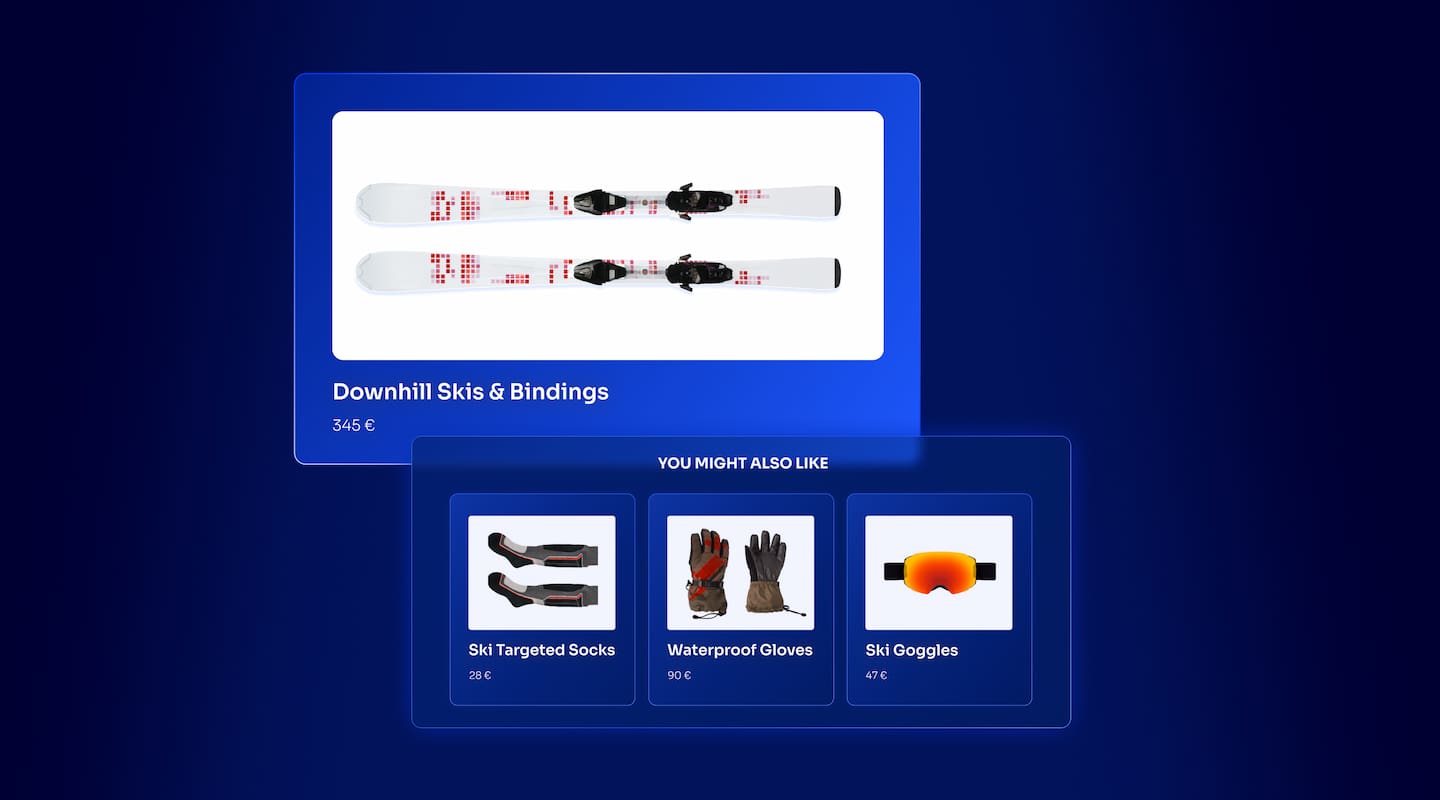Add InstantSearch and Autocomplete to your search experience in just 5 minutes
A good starting point for building a comprehensive search experience is a straightforward app template. When crafting your application’s ...
Senior Product Manager


A good starting point for building a comprehensive search experience is a straightforward app template. When crafting your application’s ...
Senior Product Manager

The inviting ecommerce website template that balances bright colors with plenty of white space. The stylized fonts for the headers ...
Search and Discovery writer

Imagine an online shopping experience designed to reflect your unique consumer needs and preferences — a digital world shaped completely around ...
Senior Digital Marketing Manager, SEO

Winter is here for those in the northern hemisphere, with thoughts drifting toward cozy blankets and mulled wine. But before ...
Sr. Developer Relations Engineer

What if there were a way to persuade shoppers who find your ecommerce site, ultimately making it to a product ...
Senior Digital Marketing Manager, SEO

This year a bunch of our engineers from our Sydney office attended GopherCon AU at University of Technology, Sydney, in ...
David Howden &
James Kozianski

Second only to personalization, conversational commerce has been a hot topic of conversation (pun intended) amongst retailers for the better ...
Principal, Klein4Retail

Algolia’s Recommend complements site search and discovery. As customers browse or search your site, dynamic recommendations encourage customers to ...
Frontend Engineer

Winter is coming, along with a bunch of houseguests. You want to replace your battered old sofa — after all, the ...
Search and Discovery writer

Search is a very complex problem Search is a complex problem that is hard to customize to a particular use ...
Co-founder & former CTO at Algolia

2%. That’s the average conversion rate for an online store. Unless you’re performing at Amazon’s promoted products ...
Senior Digital Marketing Manager, SEO

What’s a vector database? And how different is it than a regular-old traditional relational database? If you’re ...
Search and Discovery writer

How do you measure the success of a new feature? How do you test the impact? There are different ways ...
Senior Software Engineer

Algolia's advanced search capabilities pair seamlessly with iOS or Android Apps when using FlutterFlow. App development and search design ...
Sr. Developer Relations Engineer

In the midst of the Black Friday shopping frenzy, Algolia soared to new heights, setting new records and delivering an ...
Chief Executive Officer and Board Member at Algolia

When was your last online shopping trip, and how did it go? For consumers, it’s becoming arguably tougher to ...
Senior Digital Marketing Manager, SEO

Have you put your blood, sweat, and tears into perfecting your online store, only to see your conversion rates stuck ...
Senior Digital Marketing Manager, SEO

“Hello, how can I help you today?” This has to be the most tired, but nevertheless tried-and-true ...
Search and Discovery writer
You’ve got a sharp-looking website with beautiful web pages and swanky messaging, and your homepage is colorful and inviting. You’ve got loads of traffic. There’s just one problem: your shoppers don’t seem to be converting in the droves you’d like. In fact, your users are bouncing off of your site within seconds.
Why? Because they can’t find what they’re looking for with their search queries. They may not get relevant results. They may get no results. They may get results that aren’t prioritized well for their needs. They may have some other weird thing happen as they’re trying valiantly to locate an item. And as a harsh consequence, you’re continually losing potential customers (or subscribers, if that’s your business model).
What’s more, you’re probably not likely to get these prospects back any time soon (if ever). Search governs how we make many of our daily choices online, from e-commerce purchases to news and podcast selections. And in our searching, we’re spoiled by the conveniences of Google search and others. So it’s no wonder that according to a Harris survey, 74% of customers said they avoid websites on which they didn’t enjoy a stellar search experience.
So yep, you may get only one chance. And in this era of instant-gratification web search, even a single bad search experience can translate to a loss of revenue, as well as a host of other related and unrelated negative things, such as a reputation as a not-quite-right site.
The good news is that you don’t have to continue down the road to business mediocrity. A smooth, modern search experience that provides excellent search engine results relevancy can go a long way toward satisfying your searchers, many of whom will then convert and be likely to find their way back at some point. Yes, search can easily make that big of a difference.
So how do you get the right search engine that’s developed and tailored to providing a satisfying overall personalized user experience specifically for your industry, your site, your peeps?
As with many other important technological tools, you have two options. To build or to buy, that is the question. And depending on your particular needs and the size of your business, either answer could be right.
Spoiler alert: If you build it, they may come. But if you buy it, you may come out way ahead.
Building a custom search engine isn’t for the faint of heart. It may not even be for the strong of heart. It’s a daunting, long, expensive process. That’s why most companies that make the decision to build their own search engine tend to be:
Before you go doing a bunch of research on how to create a high-quality search engine and dive into the minute details of web development, indexing, semantic search, recommendations, and other things needed to create the best search box and expertly handle search terms, here are some of the pros and cons on going this route.
Are you a control freak? Then hey, building a search engine might be for you. A distinct advantage of a DIY search engine project is that you get to decide exactly how everything works. From search algorithms and a core feature set to design and functionality, the customization choices for your user searches are entirely yours. That’s heady stuff…until you realize that you’re also 100% responsible for how it all turns out.
Which leads to the drawbacks of making your own search engine.
As tech projects go, putting a search engine together is not a walk in the park. Even if you choose an open-source enterprise-search platform so you can download the source code and get online support from a developer community, it’s going to take huge amounts of expertise and time to execute this colossal feat. Such a project is also not in any way, shape, or form an undertaking for the technically challenged, or for a tiny startup.
No, this is major. Just so you know, tech giants have hundreds, if not thousands, of their smartest programmers working on initiatives like this. And for good reason: they want it to be done sometime this century, in a way that’s guaranteed to be effective and earn them back their investment, plus much more.
If you needed a search engine yesterday, and now that you’re investigating and understanding what’s been going on with your site, today you believe that you need it even more today, ask yourself these key questions:
The upshot: you’re going to need to do a ton of processing complex functionality, such as for implementing synonyms and teaching the search engine how to understand similar terms and phrases. A small team of developers typically doesn’t have the bandwidth or capacity for all the tasks and tests before going live. Plus, for most companies, this time commitment could be used more effectively for other priorities.
Let’s say that after doing your software development, building, and debuting of your new functionality, you get an idea on how to make the search results more accurate for a particular subset of your site users. However, this search results page update will take your in-house team many days or weeks to construct and build efficiently, not to mention meticulously test and tweak. Once again, a resource drain.
The initial price for implementing a customized solution may well be cheaper, on average, but in the long run, maintaining and upgrading the system could cost more. Then there’s acquiring the equipment and know-how. Such skill specialization is not cheap…ready to slash a gaping hole in your company budget?
Starting with a solution that’s been tested, tried, and tweaked has its advantages.
Regardless of your requirements for a search engine, a SaaS solution will come with a host of fully realized beneficial features, such as AI-search capabilities and insights. You can shape and mold the road-tested functionality to make your search capabilities just right for your users.
If you’re lacking the resources and talent in house to make your own search engine, this is a quick and dirty alternative.
Time no longer needed for building a search engine from the ground up can be instead allocated to essential priorities. Rather than spending weeks or months futzing around figuring out how you’re going to build your search engine, you can skip ahead by securing an existing solution that meets all your requirements, focusing instead on how you’ll drive revenue through immersive, simple search. After that, you’ll be close to the moment when you can sit back and watch your engagement levels start to climb.
A SaaS search provider has the deep knowledge and expertise to help you create a well tailored search experience. They’ve painstakingly built a search engine that has all the breadth and capabilities you need from day one. That means you’ll be able to surpass the prospective “bare bones” challenges of a self-build and start off further along, with enhancing and fine-tuning the search experience for your users.
A SaaS solution is considered one of the most timely and budget-effective ways to create the best search engine experience for your visitors. Why? You get to piggyback on the expertise of those who know how to build the best technology. They give you a hosted API, and then you can continue to tap their know-how when, for instance, you reach out about using the solution to further your search ambitions in one way or another. Plus, having a solution for which updates can be done automatically means you’ll always have the most efficient search engine technology at work for your users’ benefit.
When your initial solution setup is out of the way and things are up and running, your costs will be lower, whereas if you’re building the search engine from scratch, the updates and upgrades will run you considerably more. With a SaaS search provider behind you, upkeep costs should be part of the package, which lowers your overall costs.
When using an in-house team, search engine results-page features such as multi-language processing, typo tolerance, and synonym support typically take a long time to build. With a SaaS search provider, you can simply choose and take advantage of the available capabilities to quickly create a more fully customized solution.
There’s potentially one main drawback to teaming with an expert:
Migration projects can be laborious and expensive, and switching vendors midstream just isn’t practical or preferable from an economic or logistical standpoint. So using an SaaS search provider means you’ll stay with them for a long time.
The caveat: starting a successful long-term working relationship with the right provider is undoubtedly a game changer. Having the right partner to help you optimize means integrating a search engine that truly complements your business, scales as you need it to scale, and can flex along with any of your changing business needs. Oh, and of course there’s that added benefit of collaborating with the right provider: impressing your users and increasing your revenue.
So should you build it or would you be better off buying it?
If you’re gravitating to the buying-it camp, we hope you’ll consider Algolia. Among the many SaaS search providers out there, we believe we stand out in our ability to empower our customers with world-class search user experiences.
You’ll get a comprehensive search tool that drives user experiences through advanced machine-learning algorithms so you can command higher revenue streams and hit your growth targets. Our solution is also up to 200 times faster than competitors’, supplies features including A/B testing, analytics, and AI-generated synonyms, and gives you several pricing options.
Ready to look at buying the right solution? We have it primed, fine-tuned for your industry, and waiting. Contact our team to get the details and start creating your best site-search experience now.
Powered by Algolia Recommend